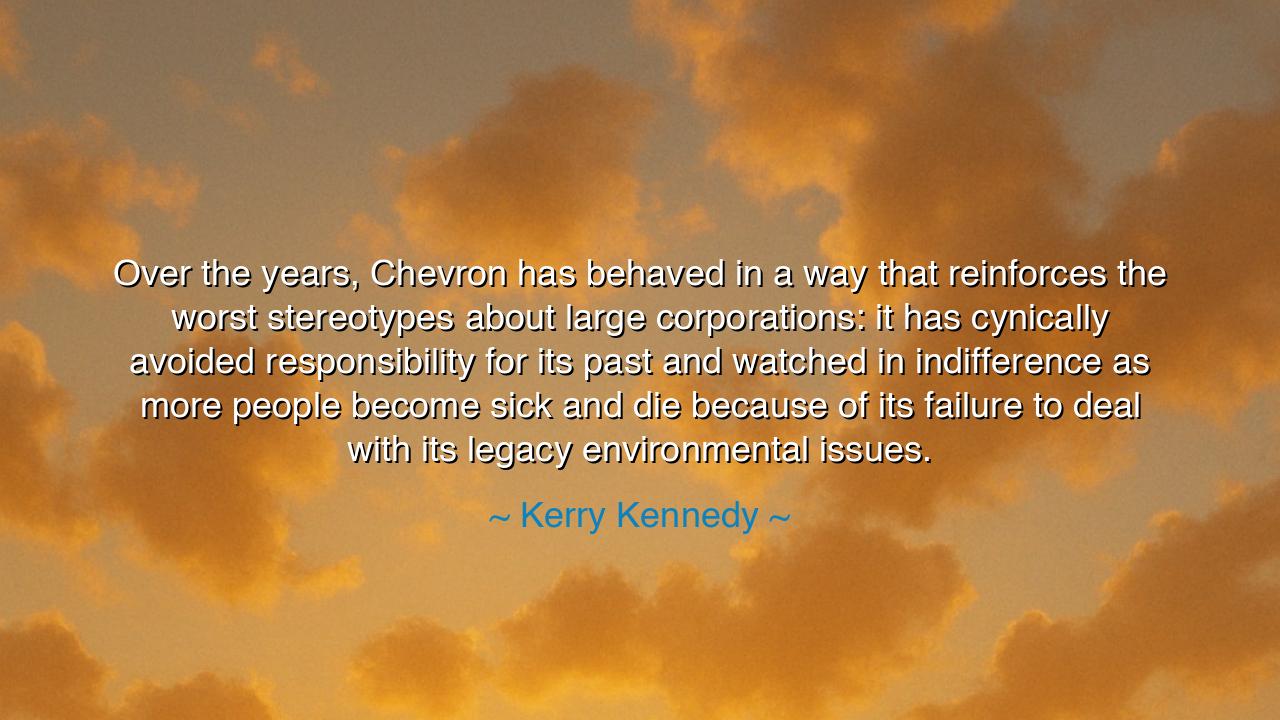
Over the years, Chevron has behaved in a way that reinforces the
Over the years, Chevron has behaved in a way that reinforces the worst stereotypes about large corporations: it has cynically avoided responsibility for its past and watched in indifference as more people become sick and die because of its failure to deal with its legacy environmental issues.






Hear, O children of justice and heirs of the earth, the words of Kerry Kennedy: “Over the years, Chevron has behaved in a way that reinforces the worst stereotypes about large corporations: it has cynically avoided responsibility for its past and watched in indifference as more people become sick and die because of its failure to deal with its legacy environmental issues.” In this lament we hear the clash between profit and responsibility, between the mighty who build empires of wealth and the powerless who suffer the hidden costs. Kennedy calls forth the truth that when a corporation closes its eyes to its own legacy, it is not only money that is lost or gained, but human lives, dignity, and the health of the earth itself.
The ancients taught that the sin of neglect is as heavy as the sin of action. When rulers polluted rivers or stripped the land bare, it was the peasants who starved, the children who sickened, the widows who mourned. The power of Chevron, as Kennedy reveals, lies not only in its machines and profits but in its choices—choices that left communities poisoned, choices that turned indifference into death. To behave thus is not merely a failure of business ethics; it is a betrayal of stewardship, a wound against humanity itself.
Consider the tale of the Roman lead mines in Iberia. Rome drew wealth from the earth, forging silver for her empire. But the smoke and poison from those mines destroyed fields, corrupted waters, and sickened entire generations. Rome rejoiced in her treasures, yet the people of the land bore the hidden suffering. So too in modern times: the wealth of oil and energy companies enriches distant boards and shareholders, while the villages near their wells and waste bear the curse of sickness and death. Kennedy’s words remind us that this pattern is ancient, and that silence in the face of such injustice only allows the cycle to continue.
The meaning of the accusation is also bound to stereotypes of large corporations: that they place profit above people, image above truth, and short-term wealth above long-term survival. When Chevron refused to deal with the contamination it left behind, it embodied this stereotype, proving it not false but tragically true. And thus the trust of the people in industry, law, and governance is further corroded. For when the mighty act with cynicism and escape accountability, the very foundations of justice are weakened.
Yet history also shows us that the cry of the people can awaken change. Recall the struggle of the residents of Love Canal in New York, who discovered that their homes were built upon chemical waste. For years, corporations and authorities denied responsibility. But the mothers and families rose with voices that could not be silenced, demanding justice, and at last the truth was acknowledged and laws were reshaped. This story is a testament to the power of courage: even when corporations turn away in indifference, the cries of the afflicted can still stir the world to action.
The lesson for future generations is clear: do not place blind faith in the goodwill of power. Hold corporations accountable, for their duty does not end with profit. Demand transparency, demand cleanup, demand reparations for those who suffer. For the wealth of a few is meaningless if purchased by the death of the many. True prosperity must flow in harmony with the health of the earth and the dignity of its people, or else it is not prosperity at all, but ruin in disguise.
Practical action lies before you: learn where your energy, food, and goods come from. Support companies that show responsibility, and resist those who cloak neglect with polished words. Raise your voice when you see communities suffering from legacy environmental issues, for silence is the ally of corruption. And above all, teach your children that stewardship of the earth is sacred, and that no fortune can cleanse the stain of indifference to human suffering.
So let it be remembered: when Chevron and others choose avoidance and indifference, they choose the path of ruin. But when people stand for justice, when they demand accountability, then truth can prevail. Wealth fades, but the health of the earth endures; profits vanish, but the dignity of humanity is eternal. Choose therefore the path of justice, for it is the only path that leads to a future worth living.






AAdministratorAdministrator
Welcome, honored guests. Please leave a comment, we will respond soon